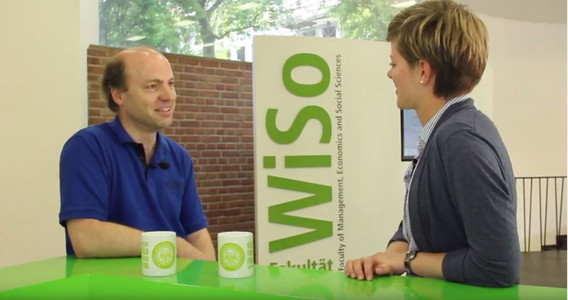Ob der Computer oder das Auto kaputt geht und repariert werden muss oder wir Medikamente einnehmen müssen - die sogenannten Vertrauensgüter spielen in unserem Alltag eine wichtige Rolle. Bei dieser Art von Leistung besteht meistens eine Asymmetrie im Wissensstand zwischen Verkäufer / Dienstleister und dem Käufer bzw. Kunden.
Da der Kunde die Qualität der erbrachten Leistungen selbst nicht oder nur schwer beurteilen kann, ist er darauf angewiesen, dem Verkäufer oder Dienstleister vertrauen zu können. In der neuen Videoreihe der WiSo-Fakultät, “A coffee chat with…”, erklärt Professor Matthias Sutter vom Lehrstuhl "Economics: Design and Behavior", welche Probleme aus dieser Besonderheit der Vertrauensgüter entstehen und was das für die Wirtschaft bedeutet.
Interview mit Professor Matthias Sutter, Juli 2016
Jennifer Garic & Kristina Wollseifen
Das englischsprachige Video finden Sie hier: https://www.youtube.com/watch?v=poBoKPdAK9s
Professor Sutter, at the moment you do research on credence goods. Medicines are goods like that because buyers neither before nor after the purchase know what exactly they need. What is problematic about that in detail?
Credence goods markets are characterized by an informational asymmetry between the expert sellers and the buyers. This means that the expert sellers know better what the buyer really needs than the buyer himself. And this is even true after the credence good has been provided. This is very crucial.
You mention three types of problems which are triggered by the informational asymmetry.
Yes, exactly. The first one is overtreatment: As a costumer you can get too much. For example: You bring your car to the repair and your motor block is changed instead of cleaning a filter. The second effect is overcharging: You bring your car to the repair and suddenly on the bill you see five hours of working time although the mechanic only needed two. Since people are typically not present during the repair this can happen. The third one is undertreatment. You get some repair, you get the bill too, but the problem is not solved. In all cases the seller can exploit the buyer due the informational advantage of the seller.
You created an undercover field experiment in which manipulated computers were brought to several repair shops in Austria. Could you please shortly explain the course of action?
We bought new computers and damaged them by manipulating the random access module (RAM) which basically means that you cannot start the computer. So if you opened it up an error message appeared and the expert seller must know what to do.
How was the conversation between the expert seller and the consumer structured?
We had two randomly designed conditions. In the first condition we brought the computer to the shop, explained the problem and at the end of the conversation we said that we needed a bill. This basically indicates that there is no tax evasion going on, it is an official transaction. In the other treatment everything was the same except for the last sentence: Now we said that we needed a bill for an insurance. This little difference had a huge impact.
What are the main findings of the experiment?
The average cost for the repair was 70 euros without mentioning insurance, it increased to 130 euros with mentioning it. This is an increase of 80 percent or 60 euros. By inspecting the computers we could disentangle the sources of the increased bill: About one third, so about 20 euros, are due to overprovision. This means, that the shops do too much, like changing the keyboard instead of simply replacing the RAM. About two thirds is due to overcharging in working time by writing about 0.5 hours more on the bill than what has actually been needed.
What does this behaviour indicate for the efficient working of an economy?
Markets which are obviously plagued by informational asymmetries generate inefficiencies, because overtreatment is simply a waste of resources: You don’t need it, they do it, no one cares about it, but you have to pay the bill. This basically leads to the situation that these markets have inflated prices because there is a waste of resources. Additionally there is a transfer of resources from the buyers to the expert sellers because they can exploit their informational advantage.
Professor Sutter, thank you for the interview!
